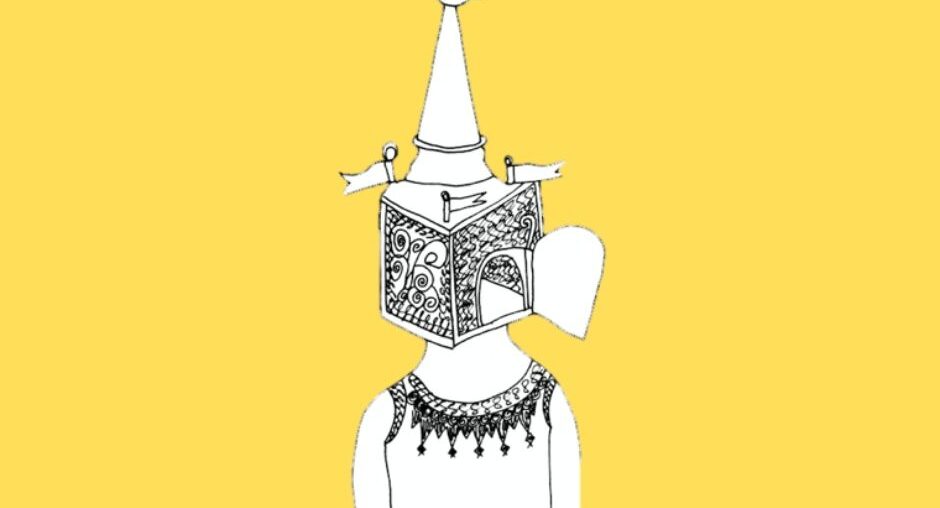My aunt buys kosher chickens for Passover— they still need plucking. She brings out tweezers she’s kashered in the dishwasher. I’ve never plucked a chicken before.
It’s not like plucking your eyebrows, Anna. Give it a good tug, says Mum.
An image: I stand in front of the bathroom mirror, plucking my eyebrows after coming home from hospital. Tweezers were not allowed on my ward.
I continue plucking the chicken as though nothing has happened. I’m used to these flashes of connective memory between my selves. Leaving the rest of the plucking to Mum, I grate two red apples for the charoset. The secret ingredient is date syrup. A splash of kosher wine, almond and walnut meal binds it together. My uncle slices horseradish root—a white sliver for each person. I set the table for twenty and he asks me what I’ve been up to lately. I say I’m working on the final page-proof edits of my poetry collection ‘Amnesia Findings’.
‘Amnesia Findings’ is my debut illustrated poetry collection. My poetry knits together memory, explorations of my Jewish culture and family, and themes of mental illness. When my publisher had asked me what colour I’d like across the front cover, I was drawn to orange but couldn’t work out why. She’d shown me a Pantone swatch and I’d picked a shade straightaway. Only later did I realise the orange is the same shade as the first colour I saw as my part-two-self; the colour of orange body-wash from the hospital shower.
*
Poetry becomes an integral part of my creative process after my hospitalisation and I start entering the Thomas Shapcott Poetry Prize each year—the award is open to full-length poetry manuscripts from Queensland poets and the prize is publication by the University of Queensland Press. Over the years I cut out poems and fine-tune others, write more and stay with the ones I’m happy with. One year my manuscript gets shortlisted and although it doesn’t win, my dream to make the shortlist has come true.
Two years later, I am invited to speak on a panel about poetry and mental illness at the 2017 Queensland Poetry Festival. It’s the first time I’ve talked publicly about my experience. I talk about moving to Melbourne and becoming unwell. Of flying back to Brisbane and waking up in hospital after my eleventh round of ECT with no memory of my admission, hospital stay or seven week Melbourne trip. I speak of my part-two self and how since then I’ve been piecing myself back together with writing and poetry and diary entries. How I started writing poetry and that the process of documenting reclaims memories that have been taken. The audience is warm, receptive and supportive and I feel empowered.
*
The following year, I prepare my manuscript for the 2018 Thomas Shapcott poetry prize. I am too nervous to post my manuscript this time; I’m anxious it will get lost in the mail. So I decide to hand-deliver it instead. A few months later, when my phone rings, I see the caller ID is the Queensland Poetry Festival Director.
‘Anna, I have some exciting news.’
I listen as the Director tells me she remembers the fortuitous day I’d hand-delivered my manuscript. I realise what is coming and try to hold back tears as she says I have won the 2018 Thomas Shapcott Poetry Prize.
‘Are you sure?’ I say.
‘Yes, yes, congratulations! But please keep this information under embargo until the awards announcements. Only tell your nearest and dearest.’
I call my parents. They are in the car and Mum can’t work out how to put me on loudspeaker. I hop from foot to foot, as I hear buttons pressed.
‘Ok, you’re on loud speaker, can you hear us?’
‘Yes—guys, I have some exciting news.’
‘Yes?‘
‘I’ve won the Thomas Shapcott!’
‘That’s so wonderful, Anna.’
Both Mum and Dad have read my manuscript. They said they’d had a good feeling about this year, that it was my turn after seven years of entering the prize.
*
One year later, as Mum, Dad and my brother Alan get ready to go to my book launch, all I can manage is a piece of challah and bowl of plain rice. We arrive at the Judith Wright Centre an hour early. As my family and friends appear in the foyer I start to feel better. There’s a special feeling in the room. Now I’m in the space and can feel the warmth and support from so many, I know I can do this, and do this well. At the microphone, my nerves leave me. I read my speech, looking up at my mother when I say: ‘thank you Mum for being my first reader and sounding board. For being my memory keeper when all seemed lost. And for helping me find my way again.’ At the end, everyone claps and cheers. Then the signing begins. I’ve brought along an orange pen to match the cover of ‘Amnesia Findings’; that first colour I saw in the beginnings of my part-two self. ‘Amnesia Findings’ is the culmination of seven years of writing and seeing so many friends and family from all parts of my life is wonderful. I imagine it’s what my wedding might be like—a beautiful celebration.


Comments are closed.